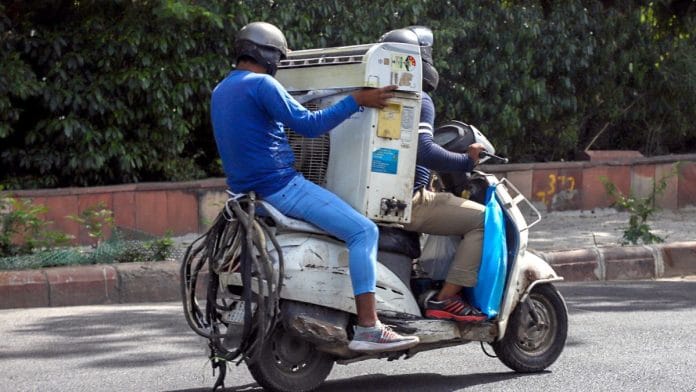New Delhi: Around 43 percent of Delhi-NCR residents who use air conditioners have reported that their A/C units are not effectively reducing ambient temperatures to the desired 23-24 degrees Celsius range, according to a survey by LocalCircles, an Uttar Pradesh-based community platform.
A/C-related incidents that occurred due to continuous operation, inadequate maintenance, dirty filters, and incorrect thermostat settings have been reported across Delhi-NCR.
The survey conducted in Delhi-NCR garnered responses from over 31,000 residents, of whom 84 percent reported using split-type air conditioners.
Also read: Climate change adding 50 to 80 warmer nights each year to Indian summers, study finds
ACs show subpar performance during heat waves
Many survey participants also mentioned that their air conditioners were able to lower indoor temperatures by up to 20 degrees only, compared to outdoor temperatures. For instance, if the outdoor temperature was 45 degrees, their A/Cs could not lower the indoor temperature below 25 degrees.
Moreover, when faced with extreme temperatures of 47-48 degrees, these A/C units struggled to cool below 27 degrees, despite being set at 23 degrees.
The report says this raises a significant question about whether the majority of AC units sold in India show subpar performance during heat waves, prompting the need for newer products that can perform effectively under such extreme conditions.
Choosing an A/C in such circumstances becomes complex because one needs to consider factors beyond cost, adds the report. These include energy efficiency and effective cooling.
The survey highlights widespread disappointment among consumers, arguing that there is a need for technological advancements in air conditioning units so that people can better cope with severe climatic conditions.
To conclude, the findings suggest a critical gap between consumer expectations and the performance of current A/C models in Delhi-NCR, particularly during extreme heat.
Also read: India at 176 among 180 countries in Environment Performance Index 2024, high emissions flagged again






